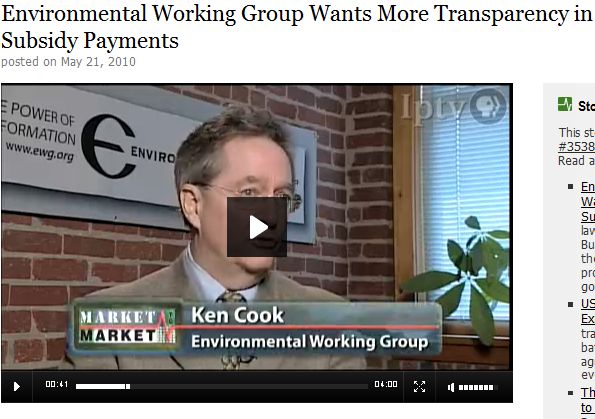
There is increasing attention on the restriction of access to government records on taxpayer funded farm subsidies reported by the Environmental Working Group. 74 percent of payments administered by the US Department of Agriculture from 1995-2009 go to the top ten percent of the largest and wealthiest farm operations. It's crucial for government to truly be accountable by identifying the farm subsidy recipients who use a maze of co-ops, paper farms and corporate entity shell games to maximize their haul of taxpayer dollars.
Other watchdog groups and investigative media are taking note of recent moves to restrict access to government data. For example, this in-depth look at transparency and reform in farm program payments ran in Iowa Public Television's Market to Market program over the weekend.
The Center for Public Integrity noted on Friday (May 21) that:
Identifying some individuals who receive generous federal crop subsidies without going anywhere near a farm has gotten trickier.
The Sunshine in Government Blog digs deep into legislative language to track where transparency was lost:
If you’re wondering, this provision was in neither version of the farm bill that the Senate and House passed. It was “air-dropped” in the private conference committee meetings between House and Senate negotiators. Unless you know someone on staff who might share a proposal quickly, the public gets no change to review and discuss openly such provisions. And especially troublesome are provisions slipped in that harm government transparency. It’s secrecy in the shadows.This law ultimately shields some very popular information: USDA reported in 2009 that the department denied 432 FOIA requests in fiscal year 2009 wholly or partially based on that law, up sharply from 167 times during FY2008. And it is one of at least 250 statutes that Congress has put on the books carving exemptions to FOIA.
At Food Politics, Marion Nestle reminds readers of the importance of details in legislative language:
Amazing, the effects of one word change on EWG’s – and our – ability to see why farm subsidies are so corrupt.
Truthdig also took note of the loss of transparency. At Change.org, David Orr writes about the usefulness of accurate farm subsidy data reporting as it applies to the broader context of food system reform.
The Environmental Working Group's farm subsidy database has been one of the most useful tools for beginning to understand — and eventually reform — the convoluted mess that is agricultural policy in this country. The work of EWG has been a classic case of follow-the-money-trail-and-discover-where-it-leads. And in this case, it leads to vastly inequitable spending that benefits the big guy at the expense of the little guy (and taxpayers). Not exactly the type of favorable press the US Department of Agriculture (USDA) or wealthy farm-subsidy recipients want.
So far the only member of Congress reported in the media with a reaction to the lack of data is House Agriculture Committee Chairman Collin Peterson. As reported by DTN political correspondent Jerry Hagstrom:
Congress changed the law to say that USDA could decide whether to aggregate all payments under individual names, and the Obama administration chose not to spend the money to do it. Peterson said, ‘I have no problem with the way [the Obama administration] has handled it.’



